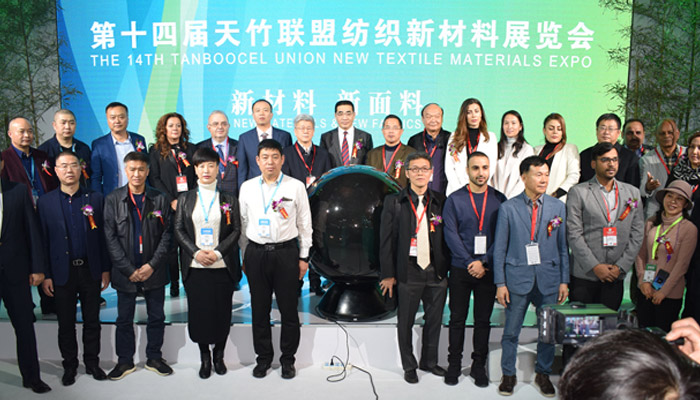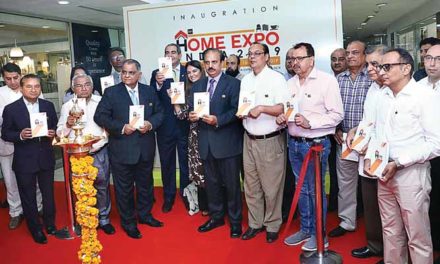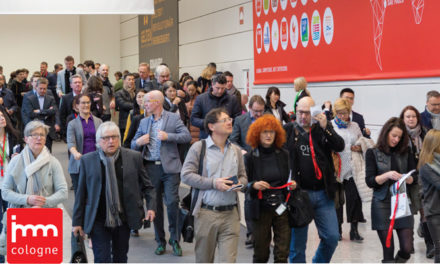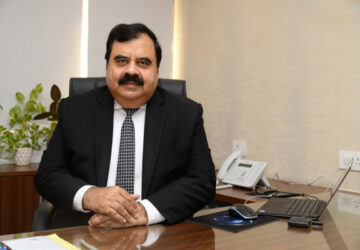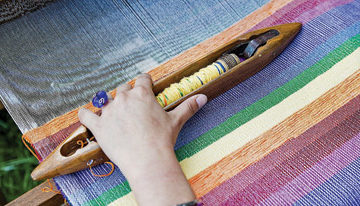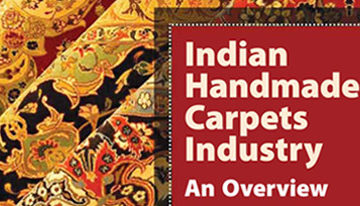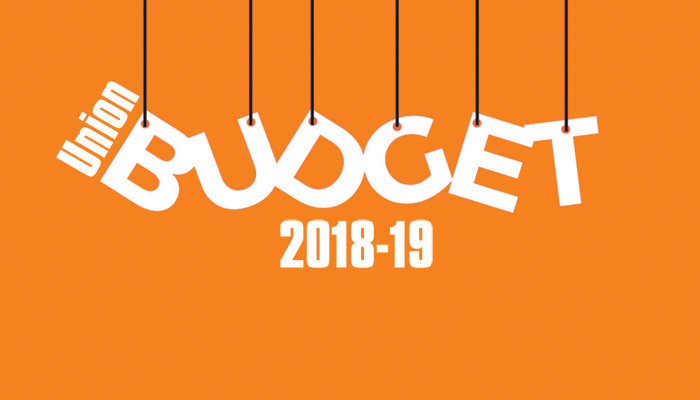The 14th International TANBOOCEL Alliance Annual Conference was organized on December 11-13, 2018 at China Textile City at Shaoxing, Keqiao China. The expo was conducted by China Tanboocel Union in collaboration with China Textile Economic Information.

(R-L) Kishan Kashiwala of Spinning King (India) Ltd., Song Dewu, Chairman of Jilin Chemical Fiber Group and Jiang Junzhou, China Chemical Fibers Association
The event aimed to build a platform for the upstream and downstream enterprises of the industrial chain to display and promote new products, to closely exchange and cooperate, to strengthen collaborative innovation, realize the co-construction platform, share resources, and develop together. Basically, to demonstrate to the whole world the outstanding achievement and innovation ability of the member of China TANBOOCEL Union.</p
More than 300 companies joined the 14th Bamboo union meeting. These included the top of textile companies from China, and US, Europe, Turkey, Iran, Japan, India, Korea, Pakistan, Indonesia etc. It was a conference cum exhibition where more than 62 Chinese companies and eight international companies displayed their yarn and garments made from bamboo fibre. Besides, almost four to five times a day, fashion shows presenting various collections made of bamboo fibre in both woven and knitted fabrics including kidswear, ladieswear, and menswear were also conducted.
During the conference Growth & Development of Bamboo Industry worldover was discussed by various speakers. Song Dewu – Chairman of Tanboocel Union, Xi Weiwei – Sales Manager of Jilin Chemical Fiber Group., Ltd and Jiang Junzhou, VP, China Chemical Fibers Association were present at the occasion.
While speaking during the event, Song Dewu, Chairman of Tanboocel Union, Chairman of Jilin Chemical Fiber Group, said that the Tanboocel Alliance platform, after more than 10 years of construction, has become increasingly mature and gradually expanded from the bamboo fibre. Covering the textile industry, including various raw materials elements, activities are increasingly rich, including R&D, design and production and sales of the depth of integration. The core idea of this congress is to “build a platform, share resources, and develop together.”If the alliance enterprises want to do better, faster, and more realistically, they must persist in product innovation, technological innovation, business model innovation, and customer orientation. Sticking to honesty and Building Enterprises. We should create value for our customers and stick to it for a long time. To realize the connection and symbiosis, the core is not just to share, but to build together, which will bring a new value pattern.”
The event was attended by more than 4,000 people majorly from China followed by India, Turkey, Korea, Iran, Japan, Switzerland, Italy, USA and Indonesia. On the first and second day, after the conference TANBOOCEL Union Awards were also organised to facilitate companies from various parts of the world for their outstanding performance in promotion and sales of TANBOOCEL fibre. Some of the awardees included: Spinning King (India) Limited – India, Speeko International – Indonesia, Segana Ltd – Turkey, Kavan Mandegar Fartak – Iran, ED Korea – Korea, Saif Group – Pakistan, Ceyteks – Turkey, Filofibra – Switzerland, Ghezzi SPA – Italy and a company from Japan.

(L-R) Khagen Kashiwala of Spinning King (India) Ltd., R. Senthilkumar from Jay Textiles, Sandeep Rohilla from RSWM Ltd., Yue Fusheng, Vice Chairman, Tanboocel Union, Jiang Junzhou, Satheesh Kumar D and Kishan Kashiwala
Apart from this, on the sidelines of the conference, a trend forecast area was also created where wide range of different bamboo fibre blends with other fibres was kept on display. Moreover, after the event a delegation of foreign people who attended the conference was taken to visit the live demo of bamboo products samples at showroom by one of the members of Bamboo Products Manufacturers Association.
These days export & corporate market is looking for sustainable, eco-friendly; green products hence demand for the TANBOOCEL – HEBEI JIGAO Bamboo Fibre has increased. There are many new value added fibres, yarns are used in fabrics now. Apart from regular products i.e. Cotton, polyester & viscose (With blends), the value addition in all stages have taken place. In all new fabrics; bamboo with different blends are more in demand. Bamboo is naturally antibacterial, very smooth, odourless (due to anti-bacterial property) breathable fibre with a very high shelf life, so as fabrics too.
Geo textiles, technical textiles, medical textiles are also fast growing segments. There are many applications of Plasma technology, supercritical carbon dioxide, ultrasonic waves, electrochemical dyeing, microwave dyeing, organic & natural dyes of textiles are some of the revolutionary ways to advance the textile wet processing.

(L-R) Ishan Umaria from A.R. Corporation, Dharmesh Patel from Eagle Silk Mills, Amish Jariwala from Narmada Silk Industries, Pravin C. Maiwala from HARI Fabrics, Maharshi Ruwala from NDR Yarns and Wang Yangang from Jilin Fibres Group
From India Kishan Kashiwala (Chairman) and Khagen Kashiwala (MD) of Spinning King (India) Ltd. for the TANBOOCEL bamboo fibre division and Ishan Umaria from AR Corporation of the filament division attended the event. Kishan Kashiwala and Khagen Kashiwala made a presentation at the conference to discuss about the growing market of bamboo fibre in India apparel and textiles industry. Besides, AR Corporation took delegation of six people from Surat along with it to China, who also displayed their filament fabrics in the conference trend area.
It is noteworthy that Bamboo fibre was invented and manufactured by HEBEI JIGAO Chemical Fiber Co., Ltd, with a registered TM of TANBOOCEL since 2002. Certified for its excellent spinning and garment properties, the bamboo fibre product is currently in use by many medium and large-sized textiles and garment enterprises in both domestic and overseas markets.
Relying on its expertise in bamboo fibres industry, HEBEI JIGAO continues to grow rapidly with focus on customer needs and product quality through technology, innovation and supply chain development. The company has invested in home textile factory and renovated its yarn mills to produce high quality bamboo fibre products.
Established in 1986, HEBEI JIGAO Chemical Fiber Co., Ltd is a leading producer and provider of Viscose fibres. With more than 2,300 employees, HEBEI JIGAO provides a wide range of fibre products that include: Bamboo Fibres, Viscose fibres, Cotton pulp, Bamboo pulp, Wood pulp, Shenmafibre, Siwear intelligent temperature regulation fibre. Shenma & Siwear are patent products as well as Bamboo fibre.
Out of total TANBOOCEL production, seventy per cent of bamboo fibre is consumed by China domestic market and rest 30 per cent is exported. In overseas, Turkey and India are the biggest markets having 50 per cent share each in our fibre exported. Otherwise, India and China are almost parallel when it comes to bamboo fibre’s consumption globally. Percentage wise, may be China has little more share but India is the second largest consumer of bamboo fibre.

S. Dinakaran with D. Niranjan Kumar from Sambandam Spinning Mills
TANBOOCEL Bamboo fibres blends with cotton/ organic cotton/ linen/ polyester and are used in terry towel, socks, knitting, weaving & home furnishing products in bulk. Initially bamboo was used in knitting, now it has started being used in woven for garments. The maximum consumption this year was by the knitting industry, especially in innerwear segment. This was followed by home textiles segment which is the other main area consuming in bulk. The maximum end products by spinners are exported overseas when compared to domestic market.
Indian domestic market is not much into bamboo products. Definitely the demand will increase in India in near future as there is huge scope. Every year bamboo fibre’s consumption is growing at 10-15 per cent. Compared to conventional cotton which is a regular product, it is more in demand for value added products. It has anti-bacterial properties so its demand is increasing among buyers who are more health conscious. In India, it has become a premium product, but in US it is used as normal fibre.
The Indian perspective

R Senthilkumar, Manager – NPD & Marketing, Jay Textiles, Super Sales India Ltd
Kishan Kashiwala and Khagen Kashiwala from Spinning King (India) Ltd. made a special presentation at the conference. During which they touched upon various topics the Spinning King & Tanboocel®’s Association, and its growth in the Indian market. “We have been selling this fibre to India for more than 10 years now and have grown the size of bamboo in this market. We have never had any problem in selling Tanboocel bamboo fibres and are very happy with this fibre selling in huge quantity. We are proud to inform that Spinning King & Tanboocel® Bamboo Fibre association has 100 per cent share in the Indian market. Year wise our sales figures were 680 tonne in 2016, 775 tonne in 2017, 900 tonne in 2018 and 1000-1200 tonne in 2019.India imported Tanboocel® – HEBEI JIGAO Bamboo fibre worth $3,601,028 with total quantity of 1,846,767. We have achieved these figures because of the high quality parameter of Tanboocel. We proudly can share that during this long business tenure; neither rejection nor any inferior quality complaint received from any of our business clientele,” said Kashiwala.

Sandeep Rohilla, RSWM Ltd.
Speaking about bamboo fibres growth in India he said, “Looking at the growing needs of sustainable products worldwide, bamboo fibre will touch new heights in sales in coming years. In coming years we expect to see huge demand for Tanboocel® bamboo fibres in local Indian market. Now most of the leading brands in India are using the same. Some of the major mills and brands using bamboo fibre in India are IKEA, M&S, ALO & BELA – USA, H&M and PARK AVENUE (Raymond, India).”
“Tanboocel – Bamboo fibre’s quality is the best than other fibres available in the market. It is “softer than cotton” and grows very fast when compared to other fibres, which take many years to grow. This fibre is stronger than cotton and used for all kind of fabrics. In India it is used majorly for knitting and weaving. In Pakistan our bamboo fabric is used for making denim fabrics. In China we process this yarn to make bed sheets, which are exported to Europe and Canada. Bamboo fibre can be used in any textiles. Out of all segments bamboo is mostly used in knitting for making innerwear, sportswear and yoga wear. A total of 35 per cent of bamboo fibre is used for jersey fabrics,” said Kashiwala.
(By Arvind Kumar, Editor Home Textile Views
who attended the conference in China)

